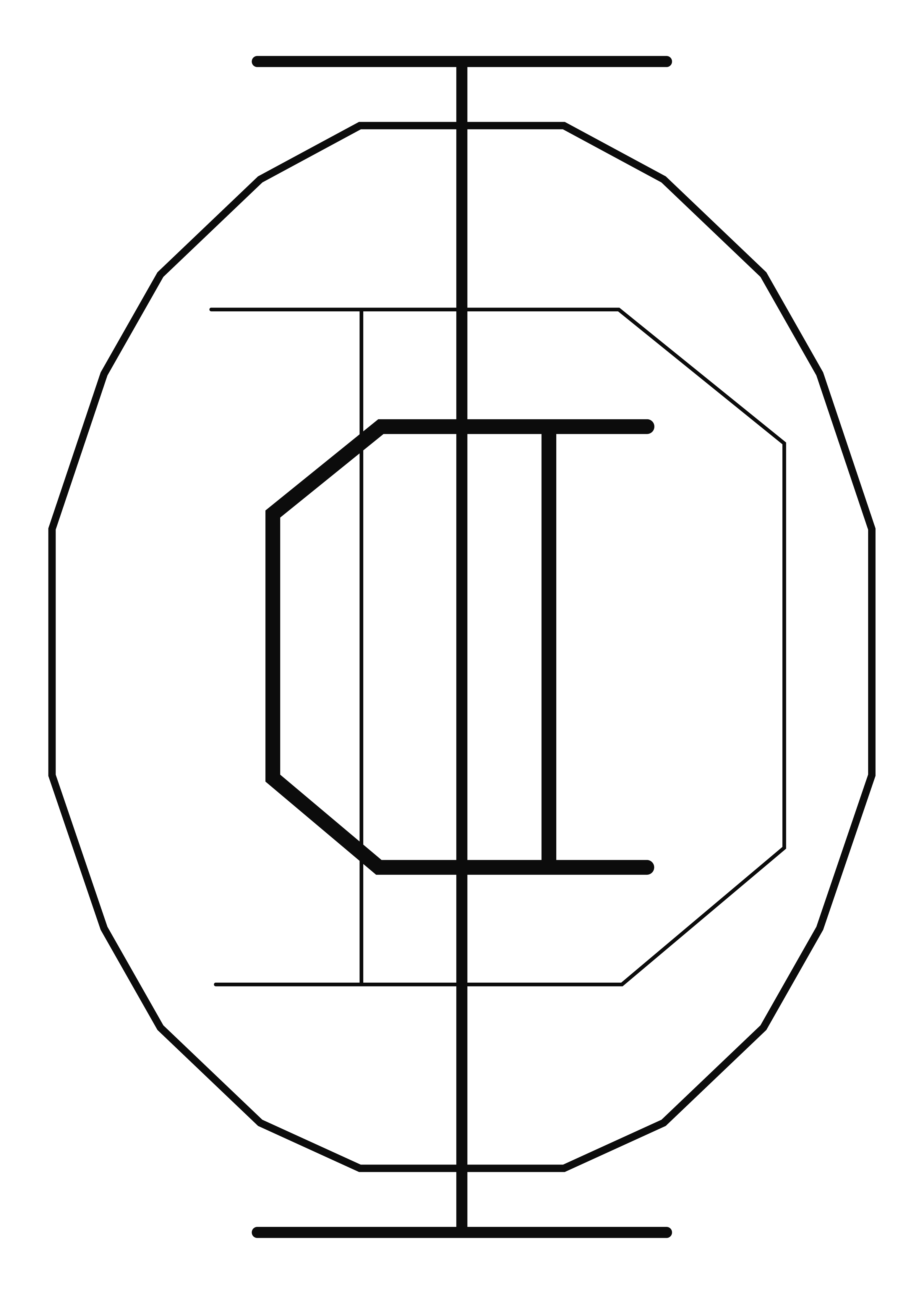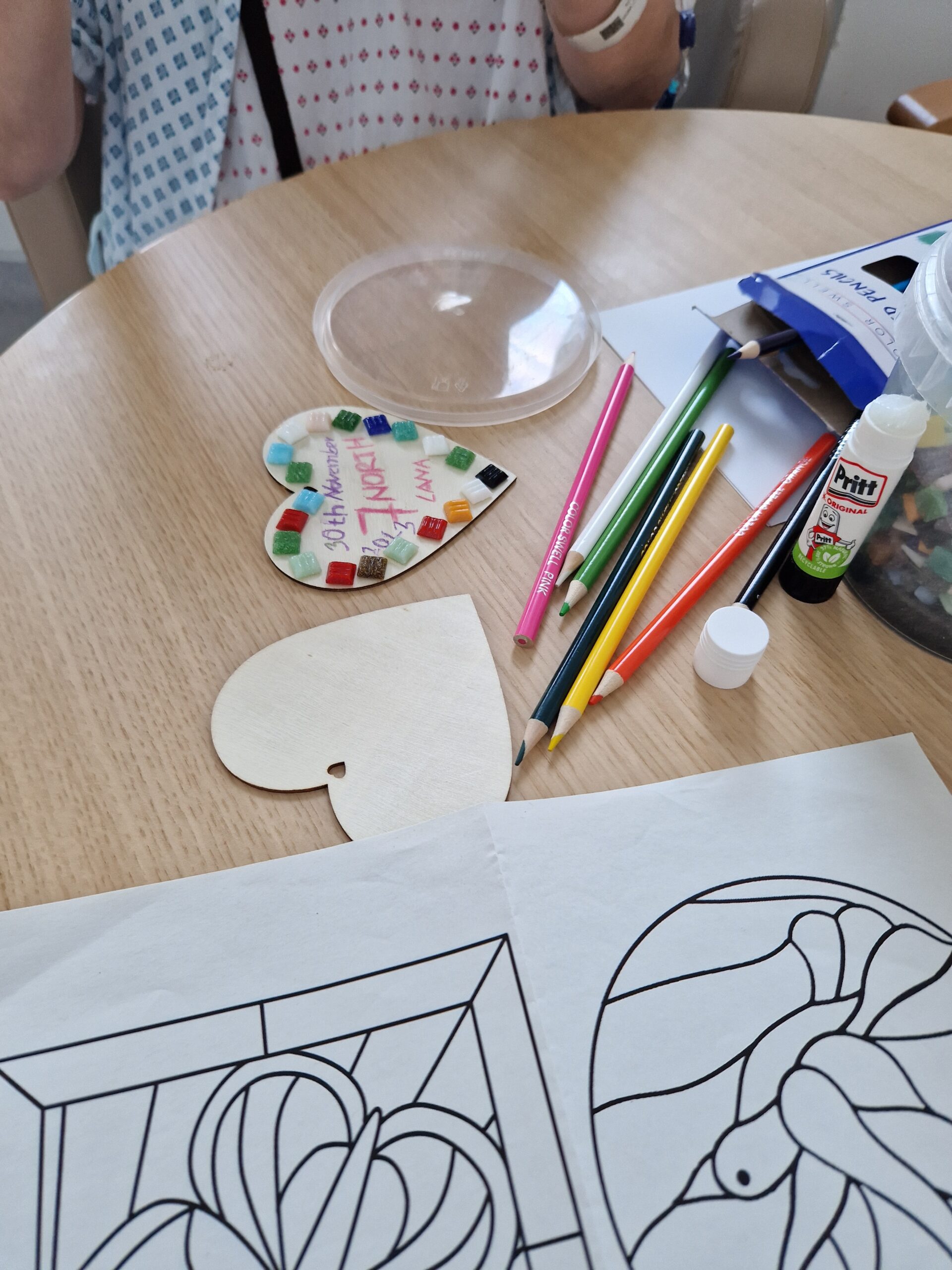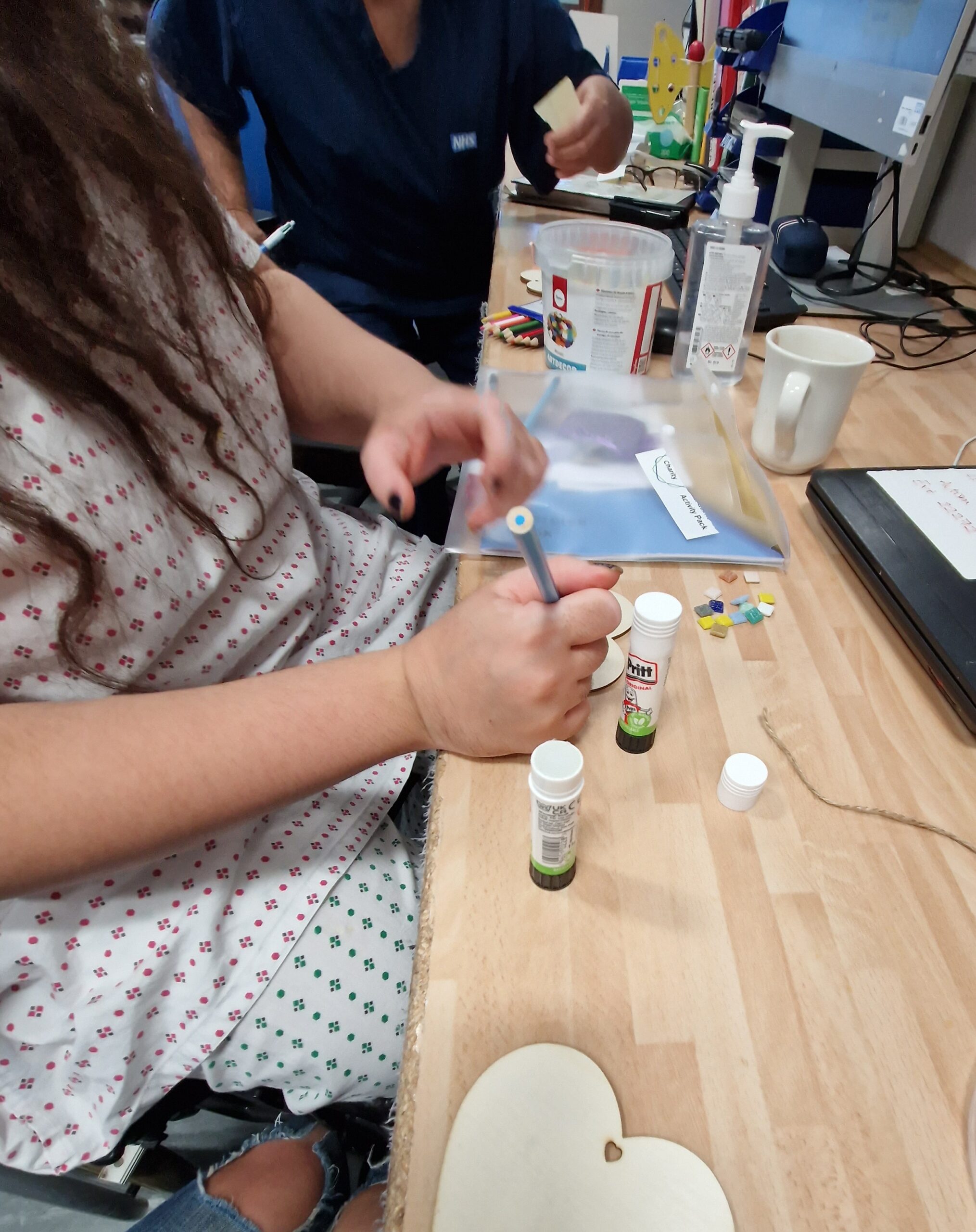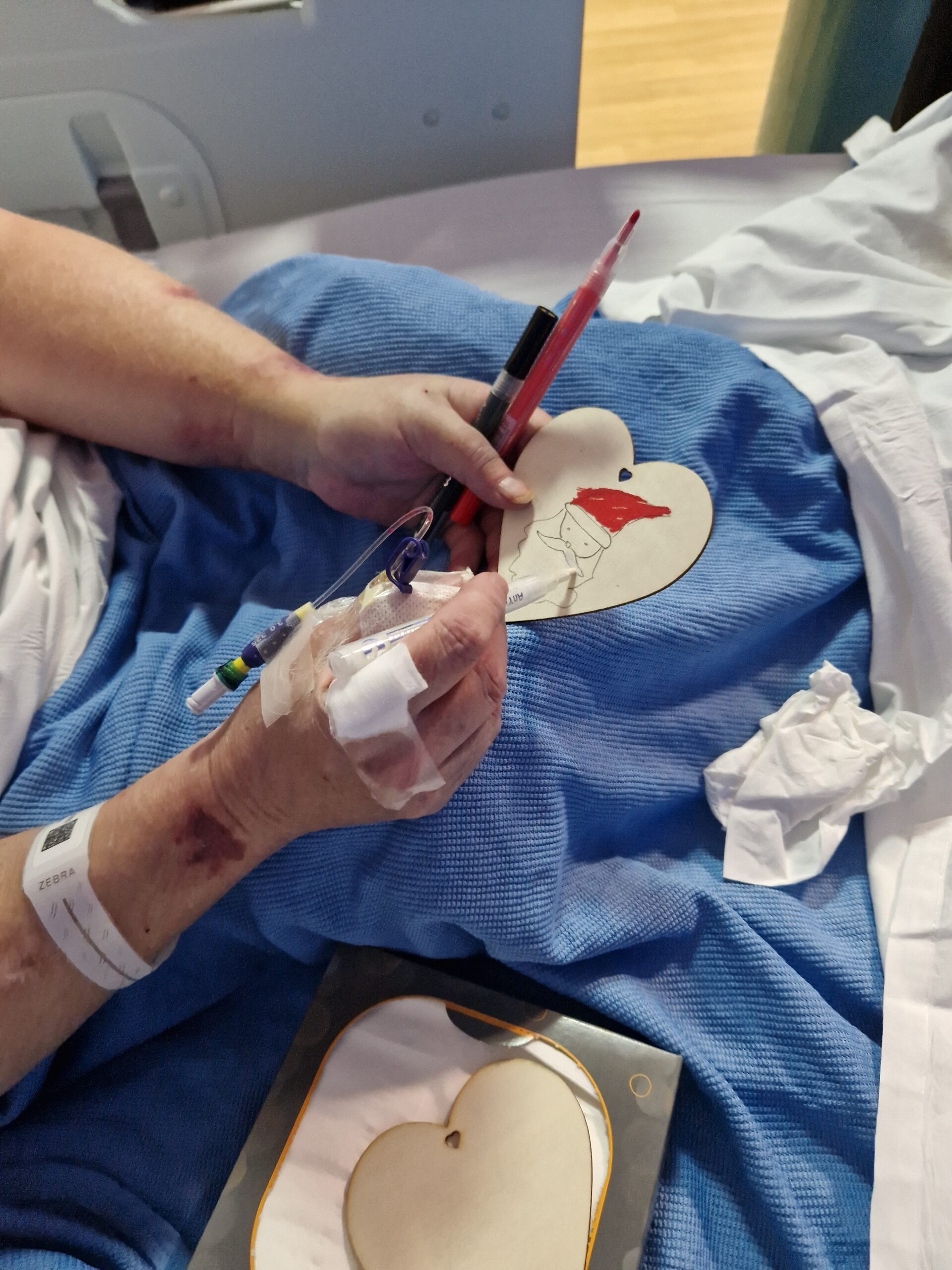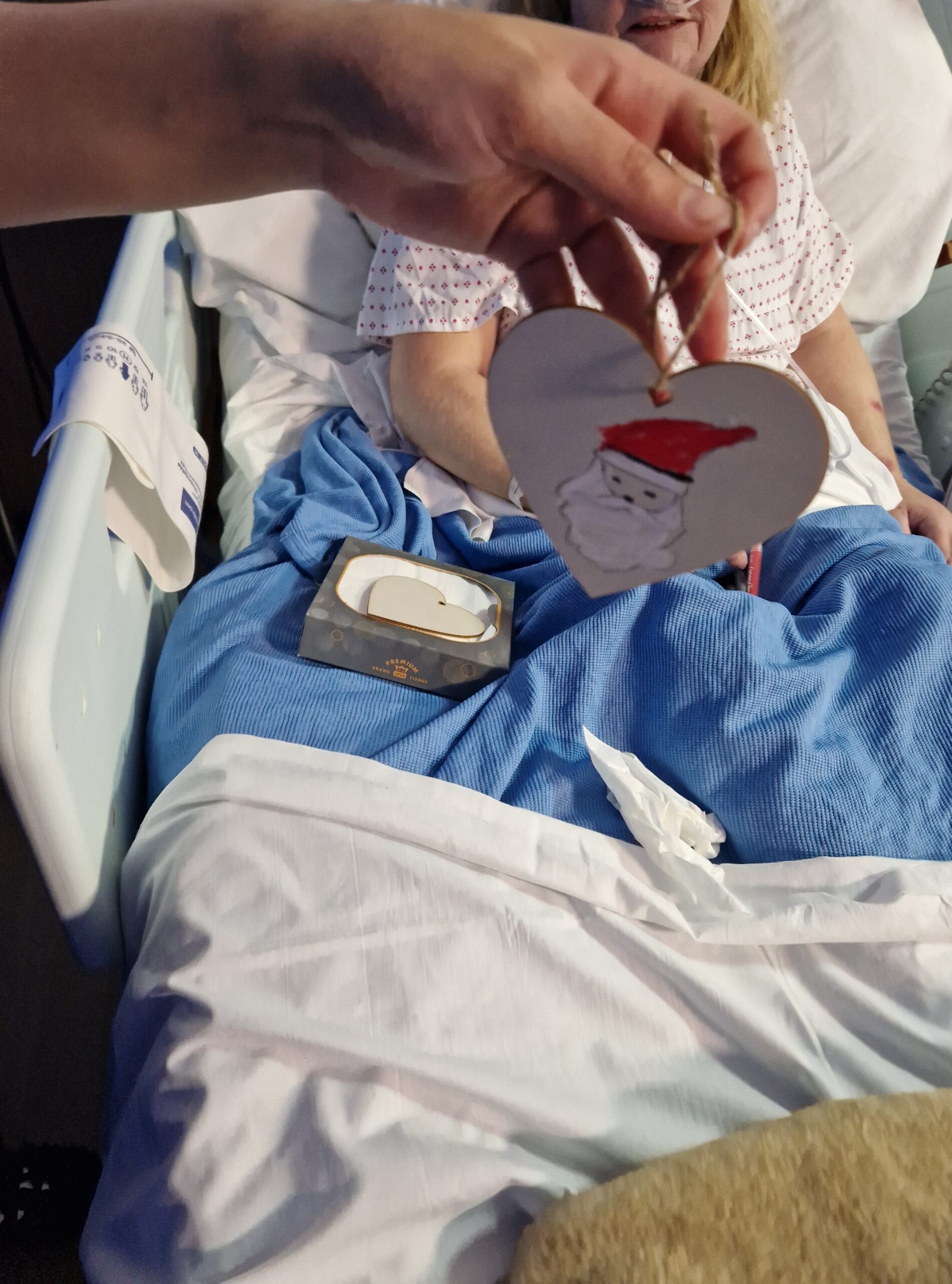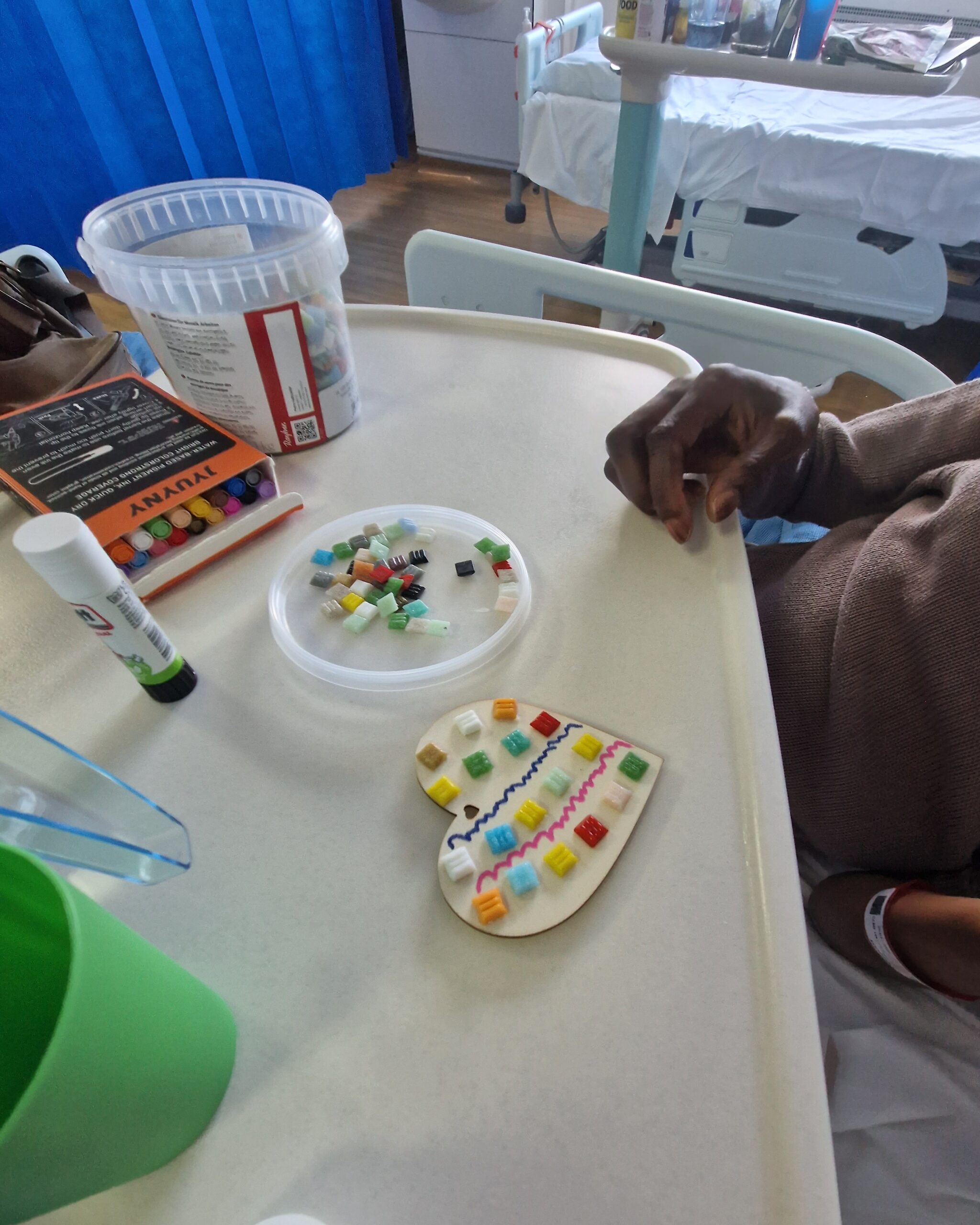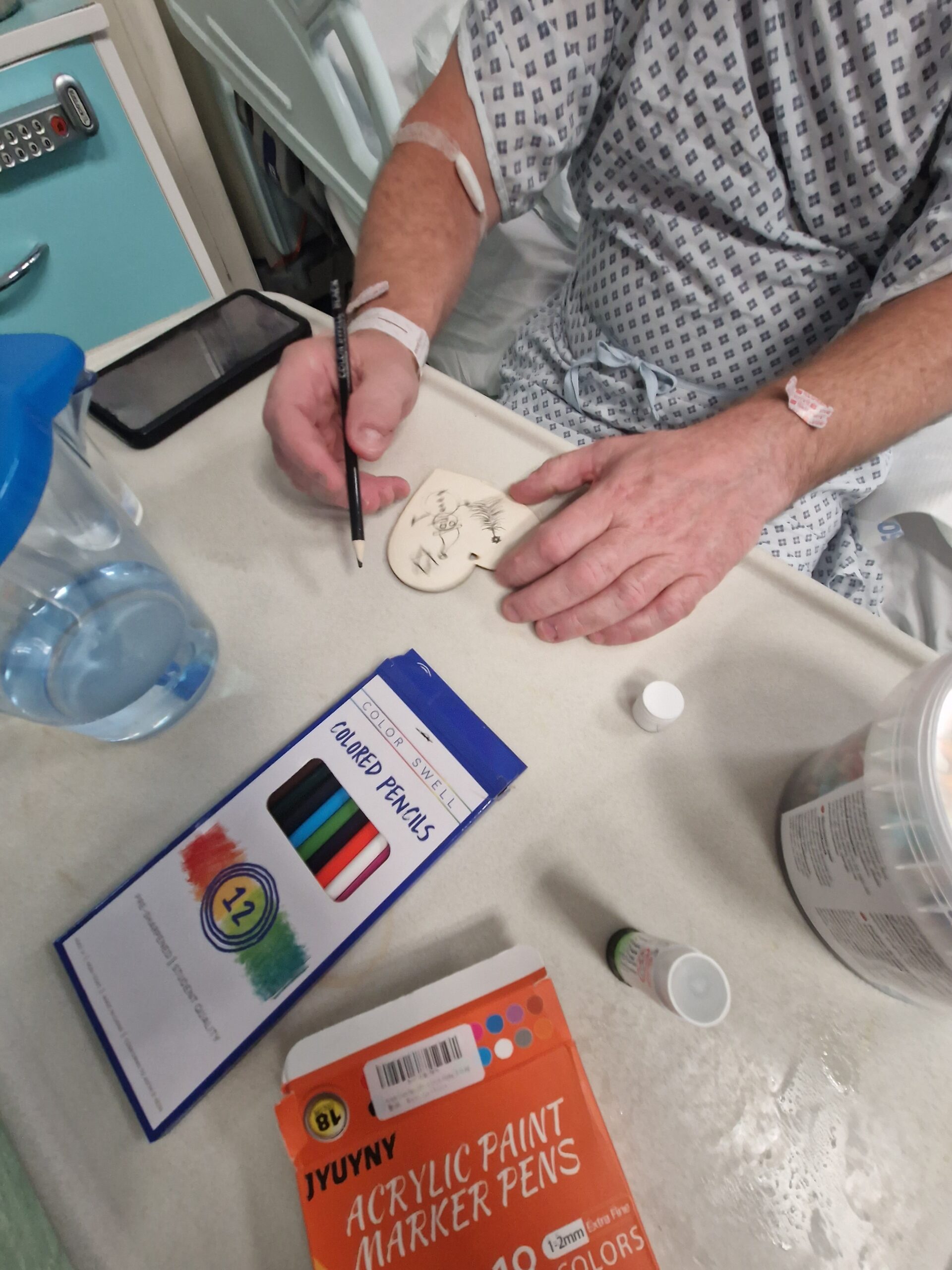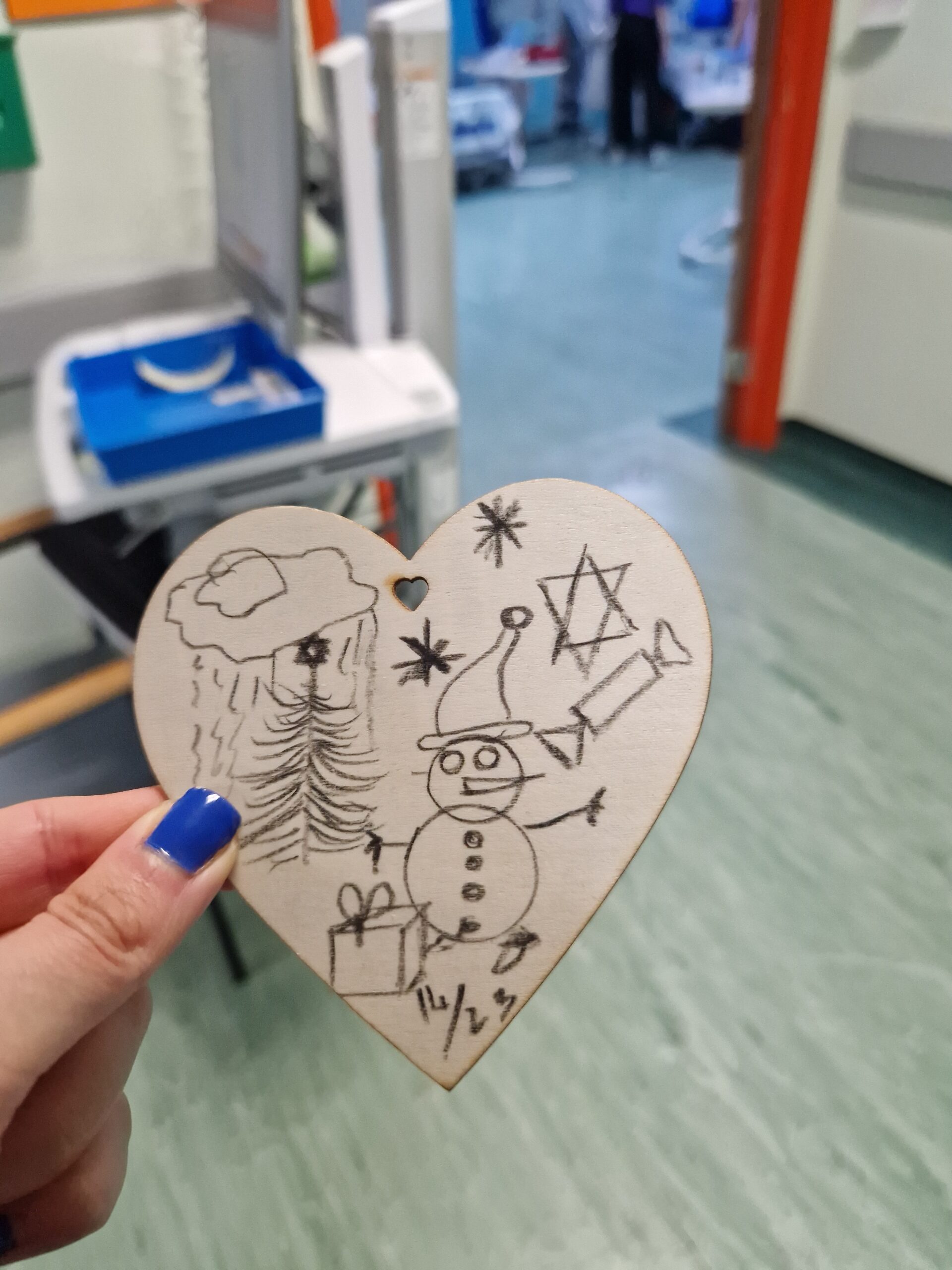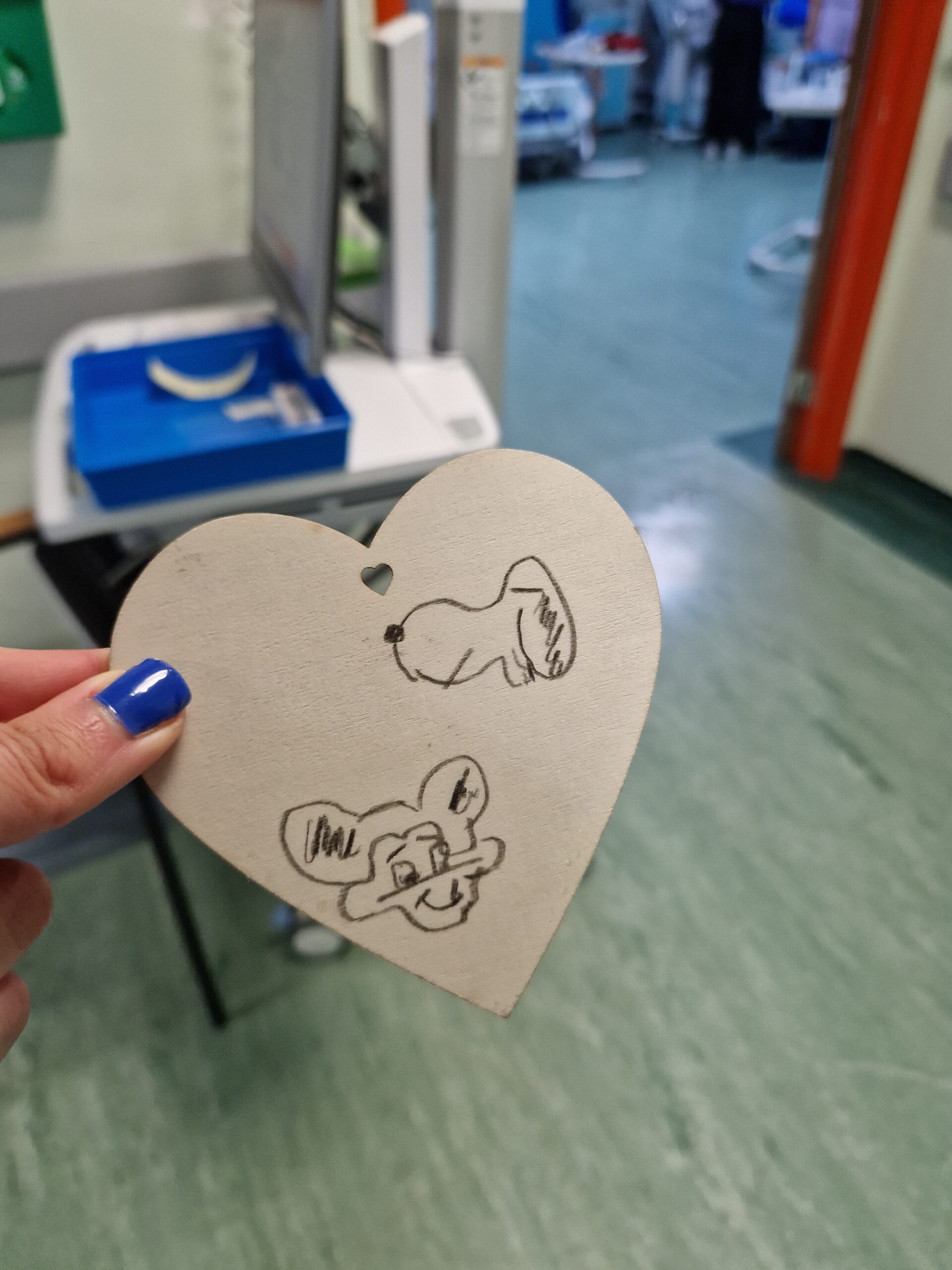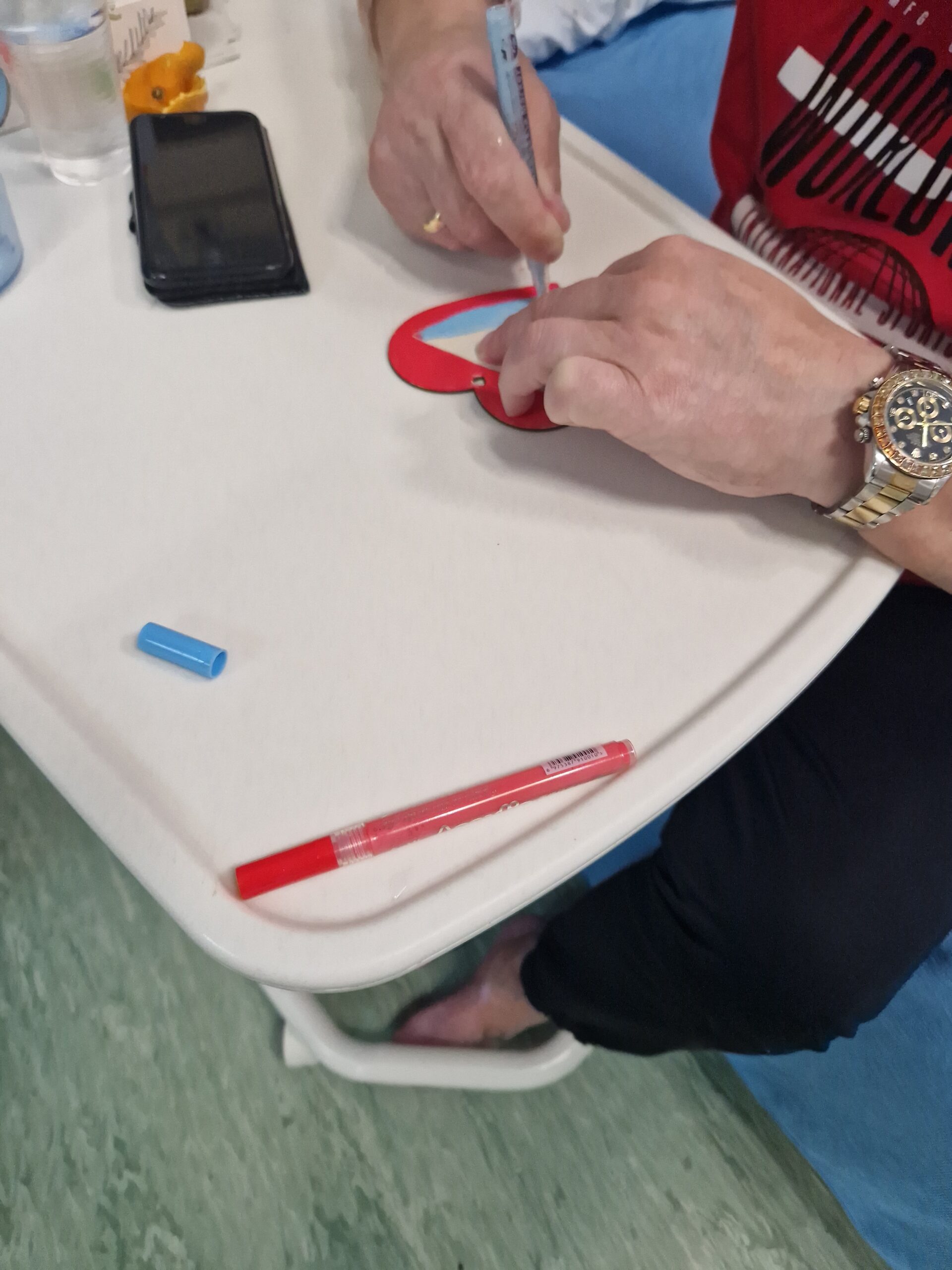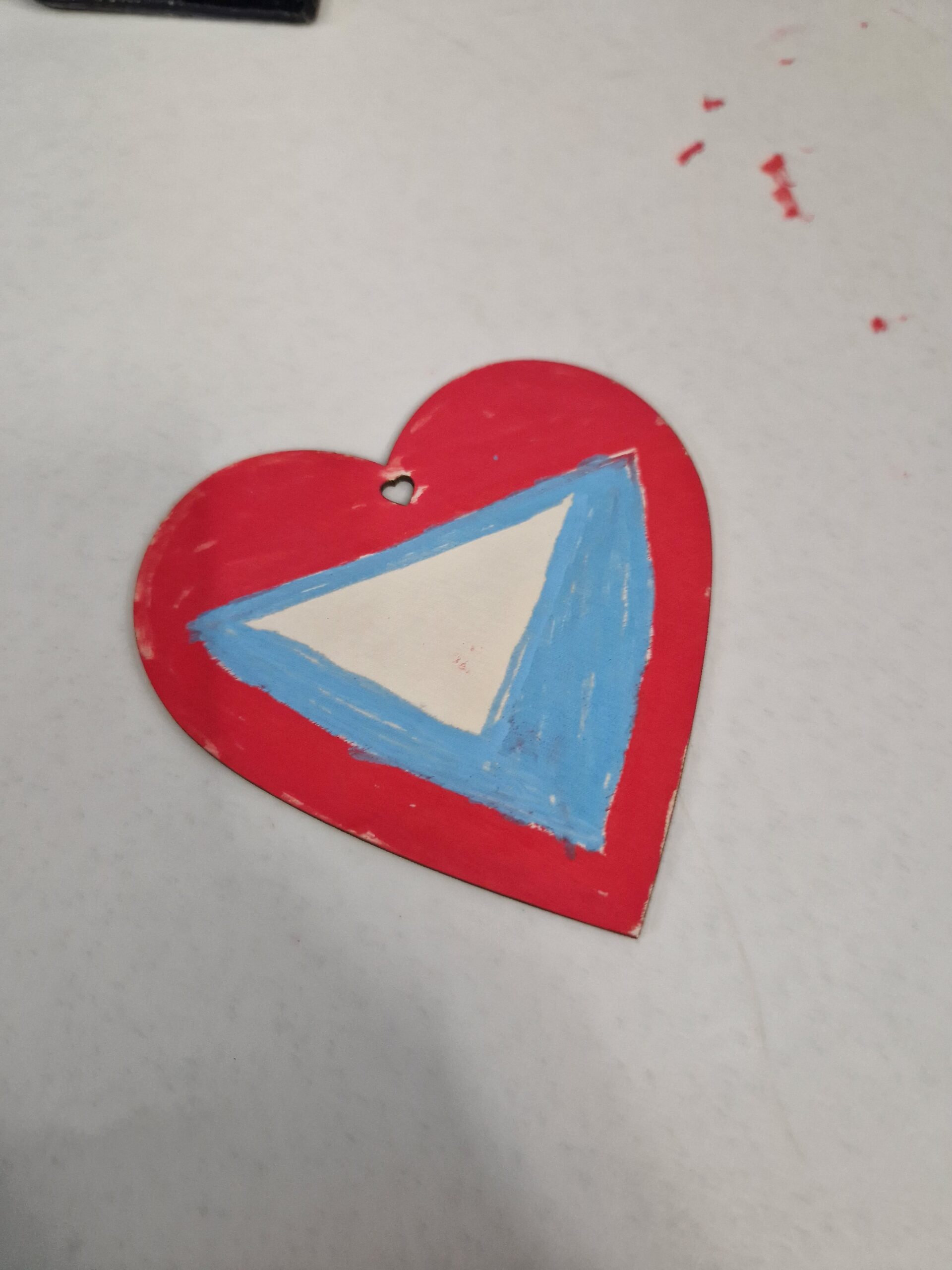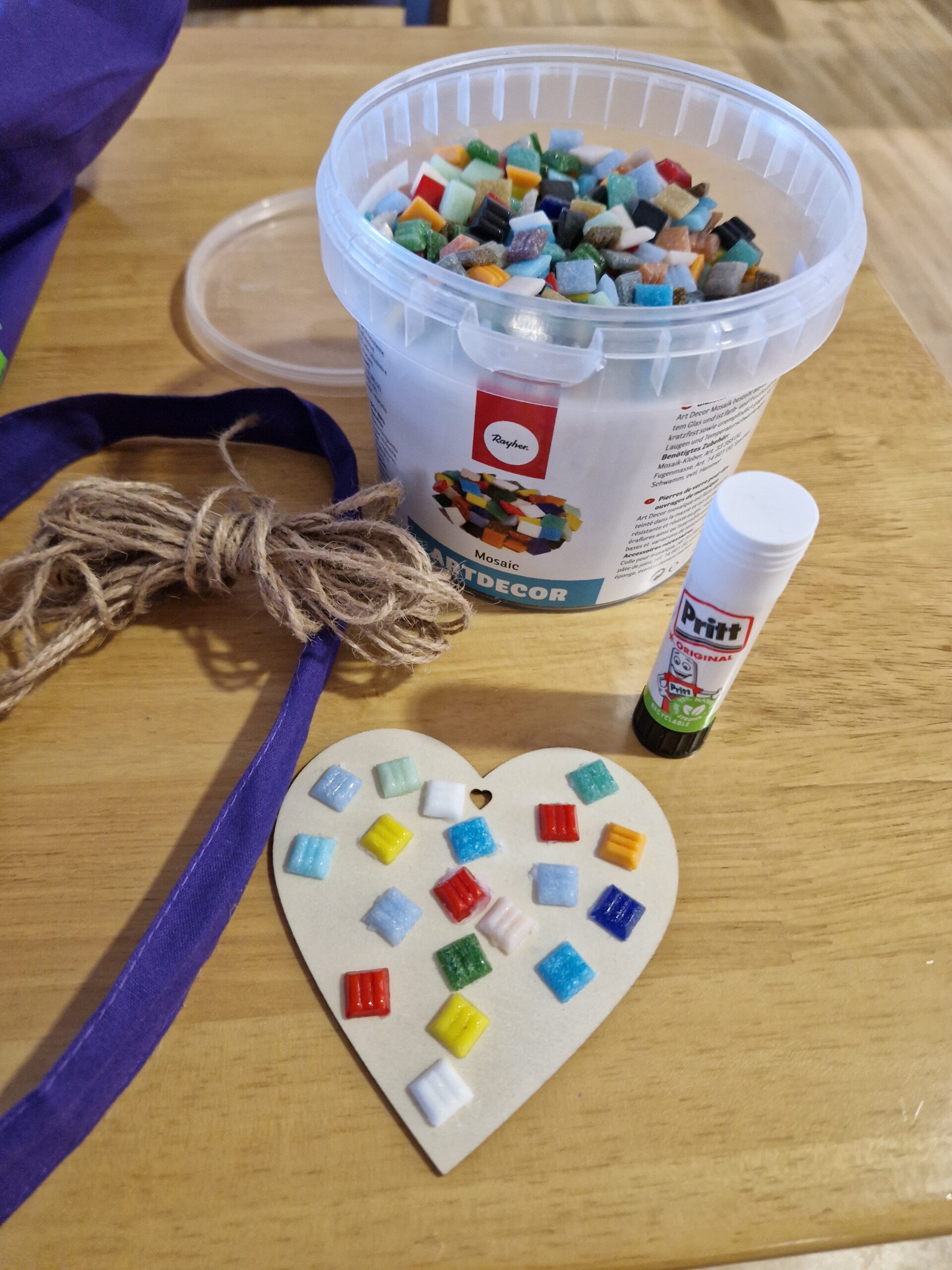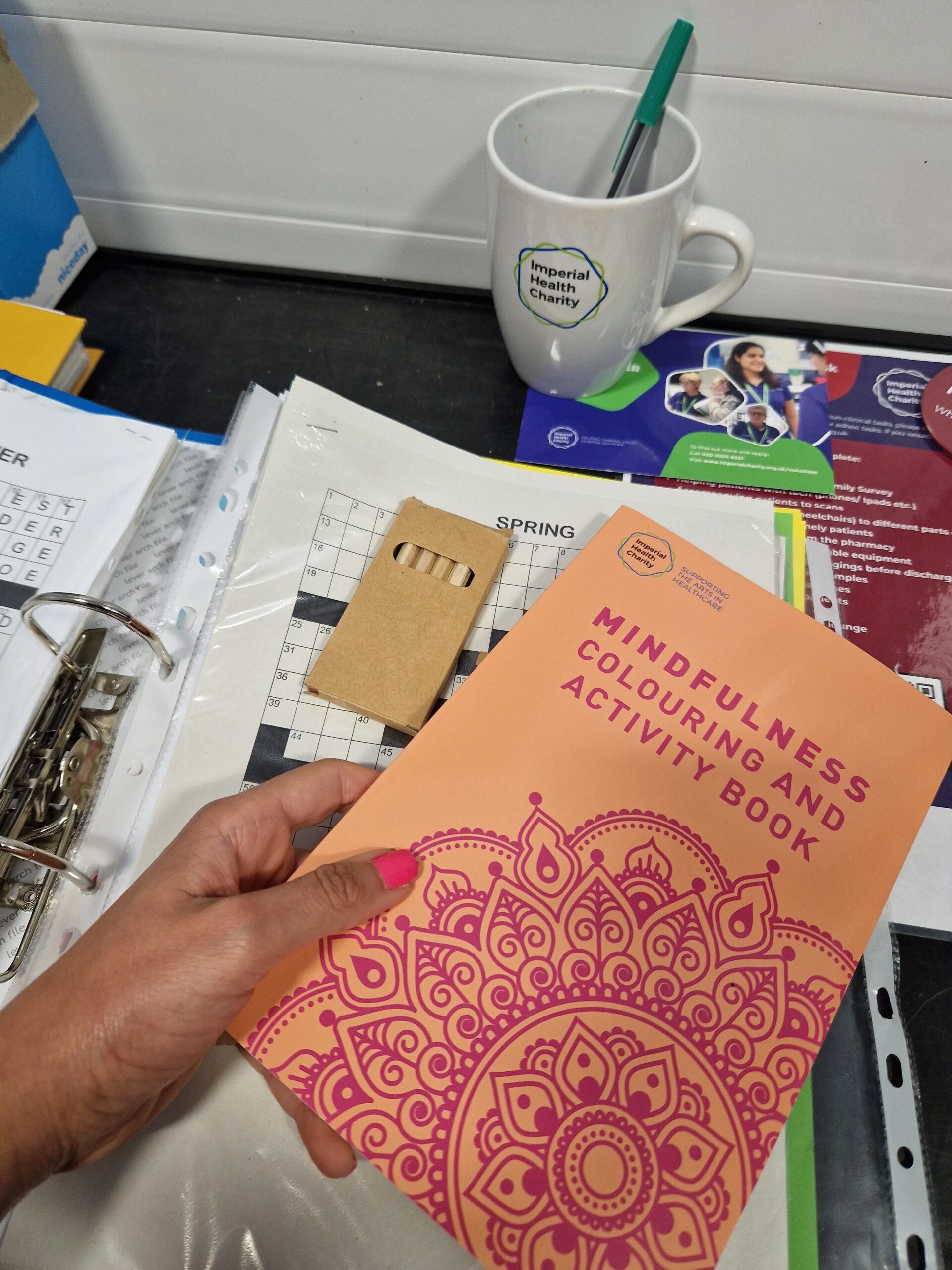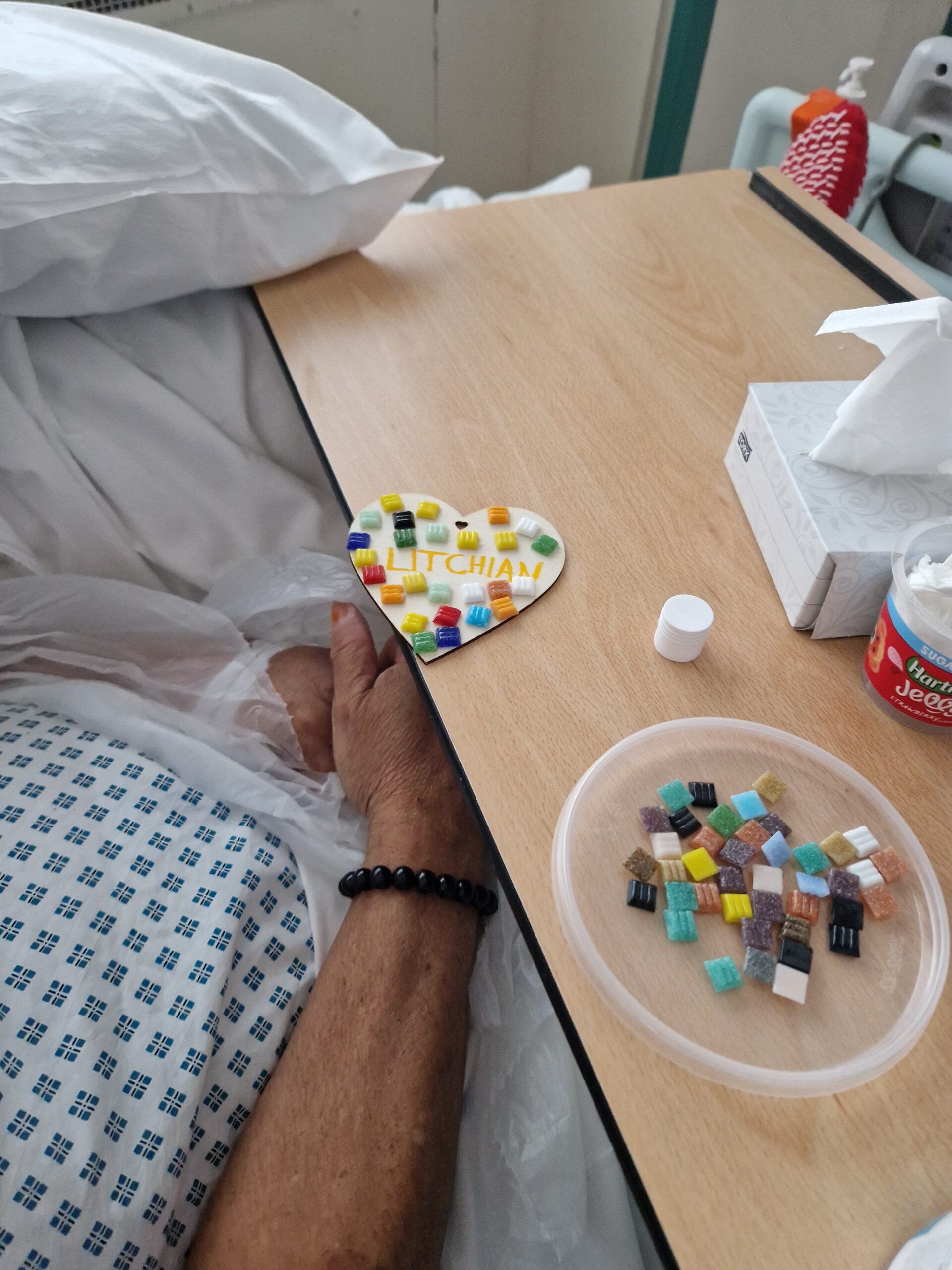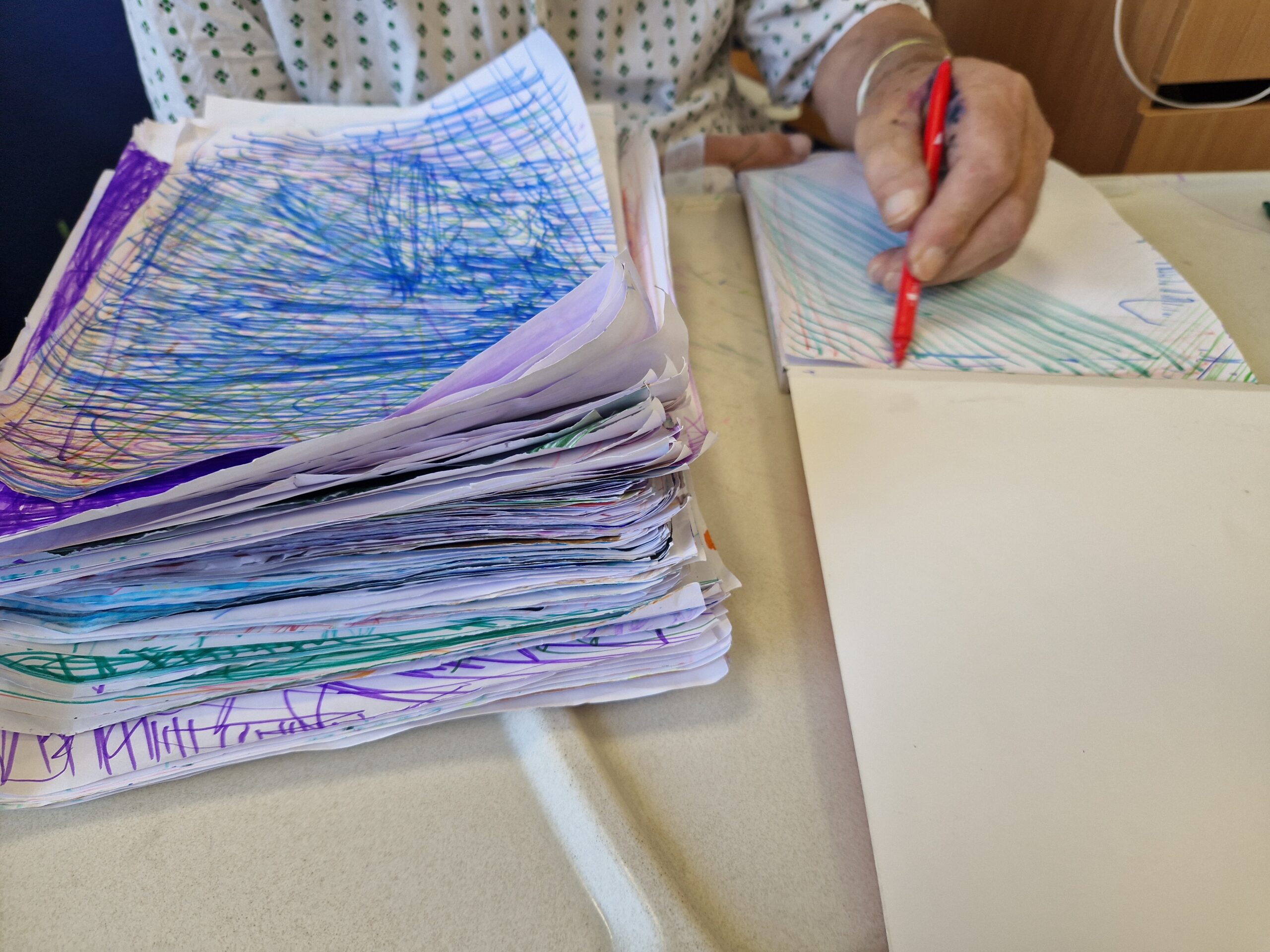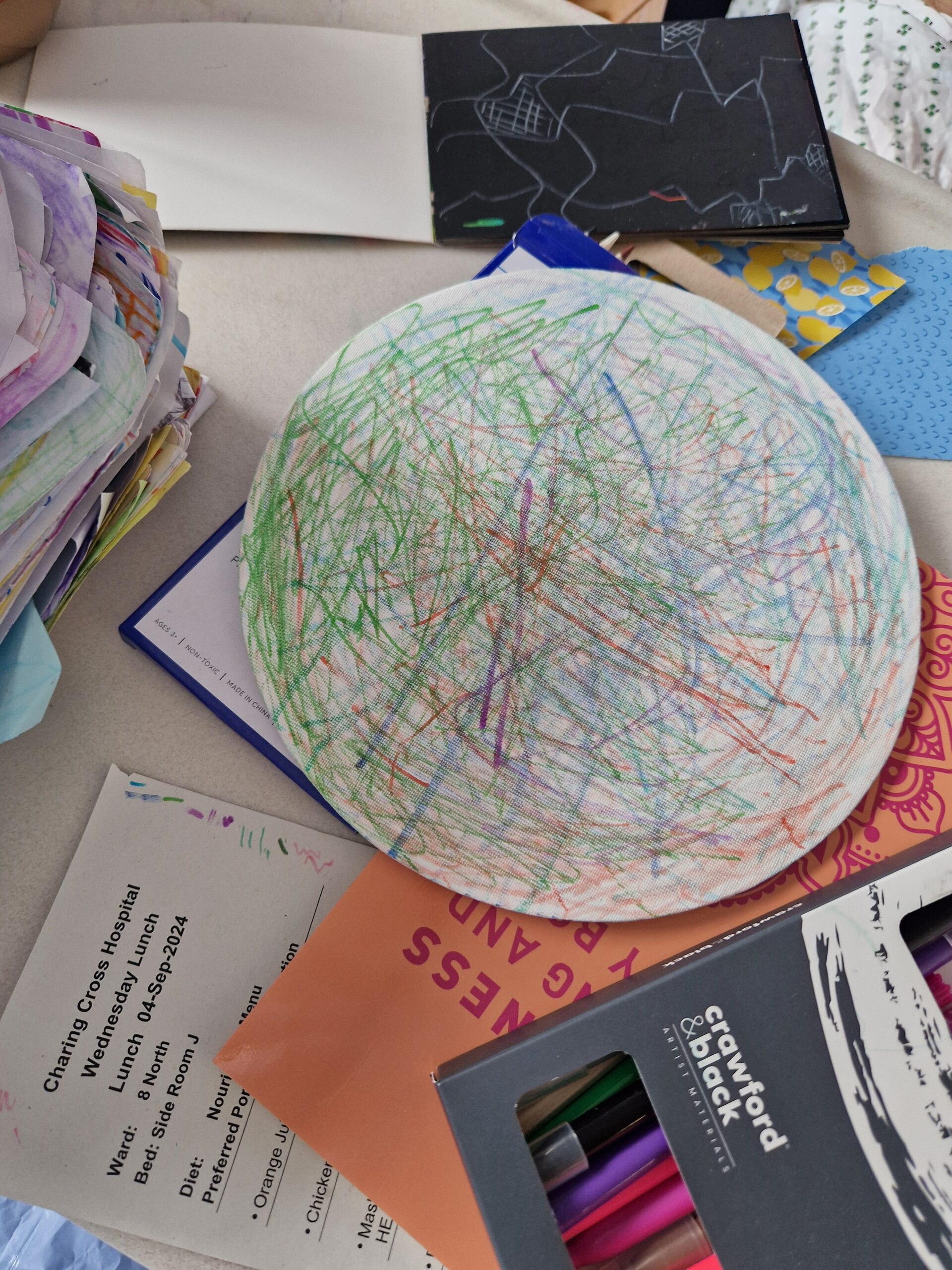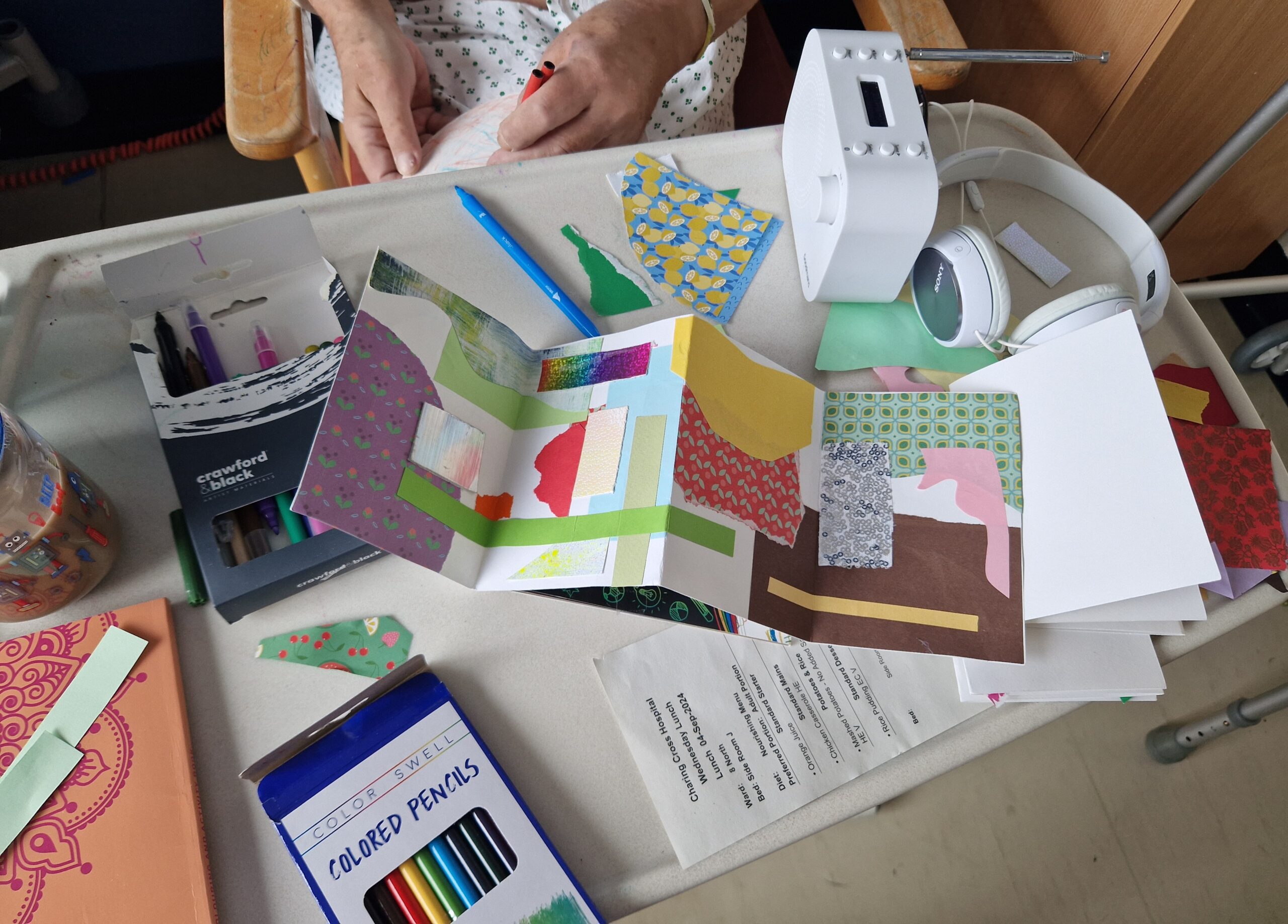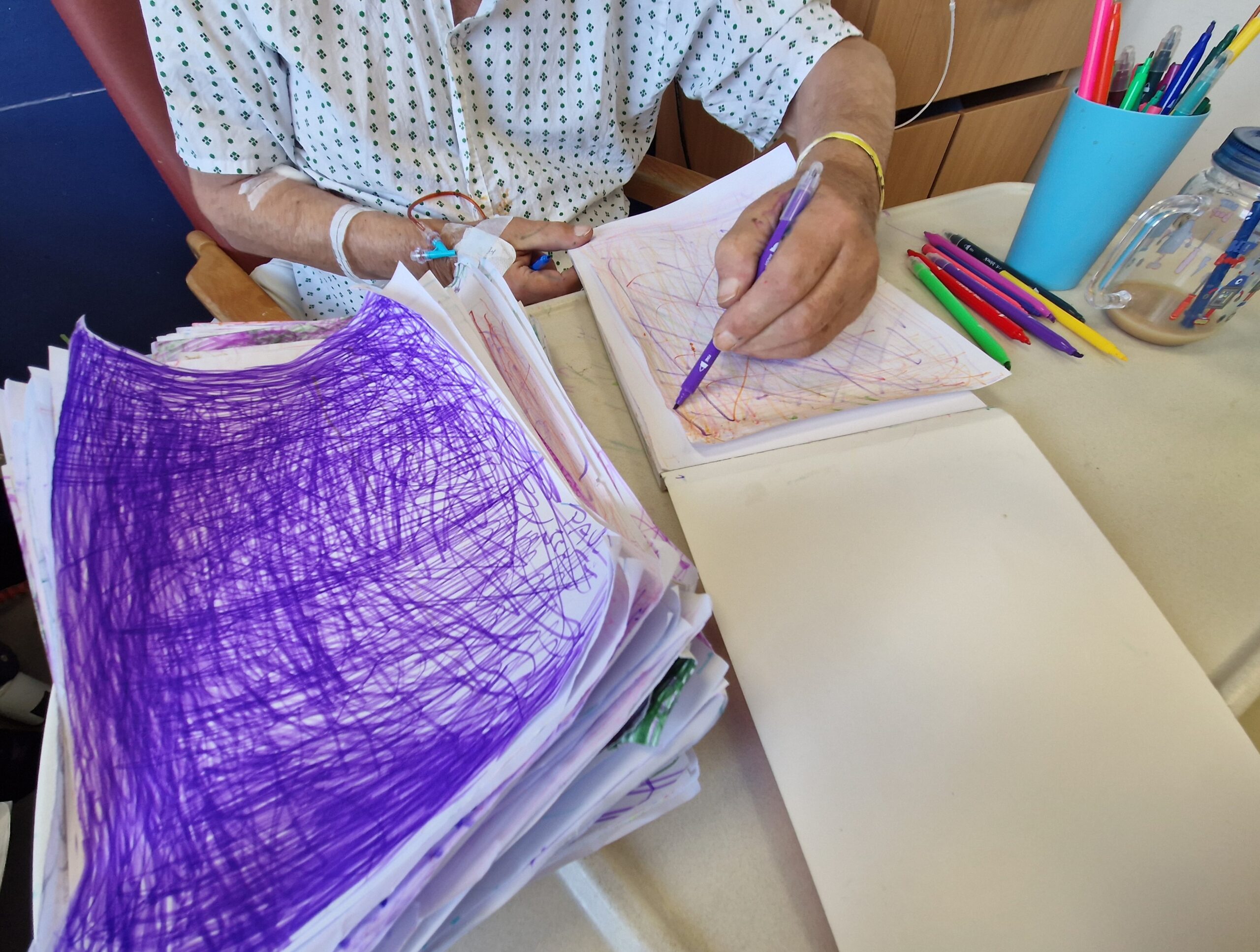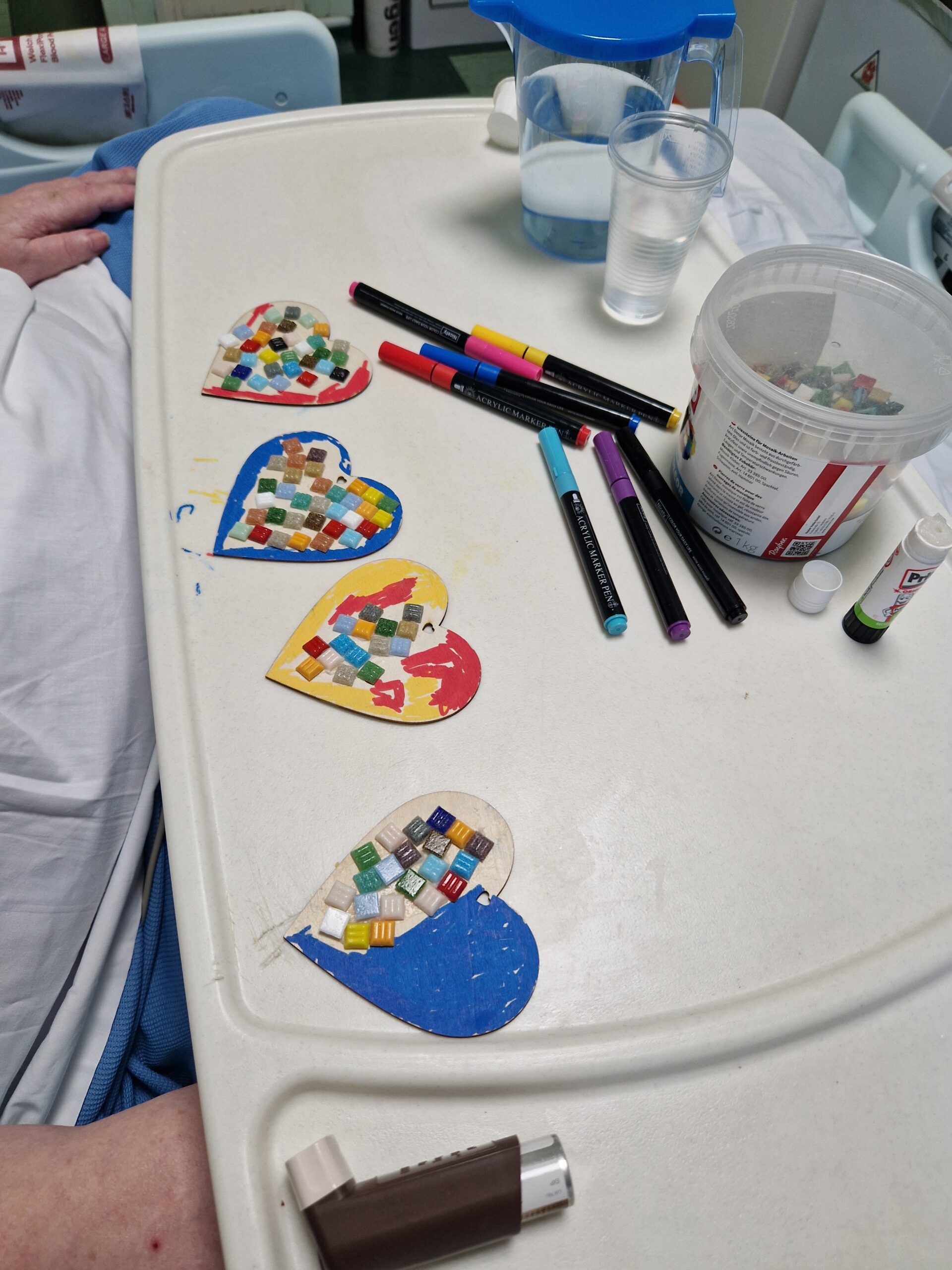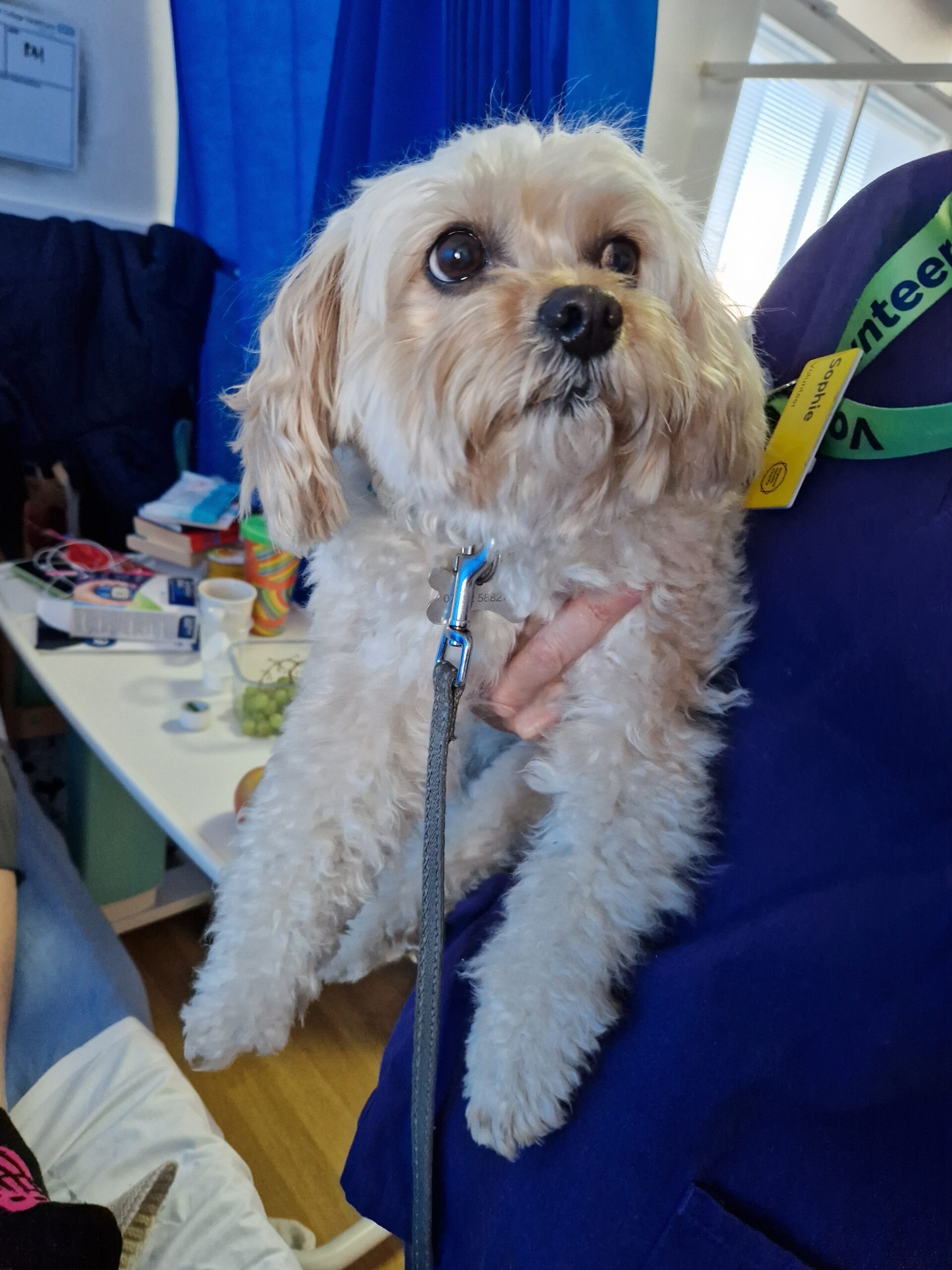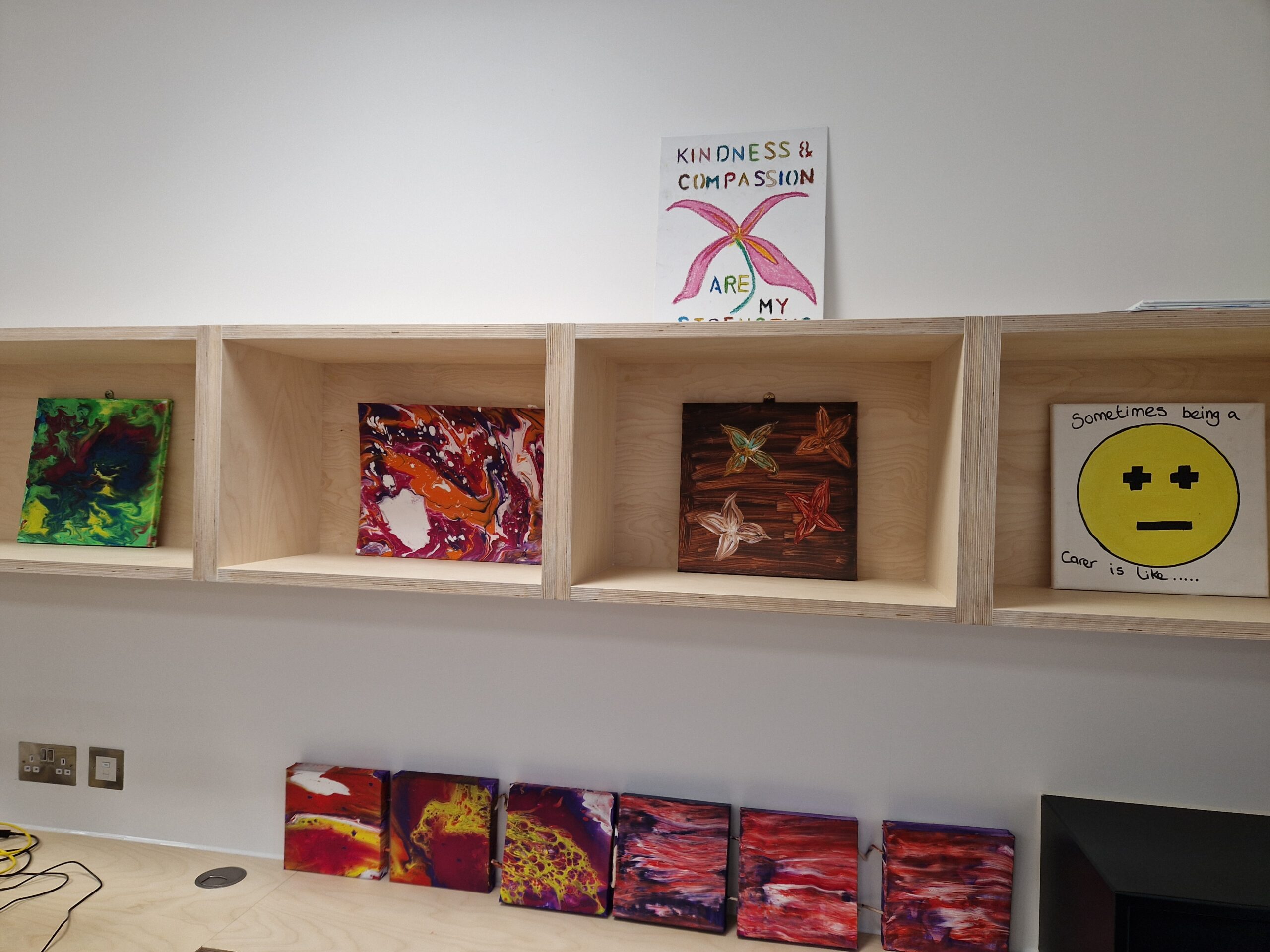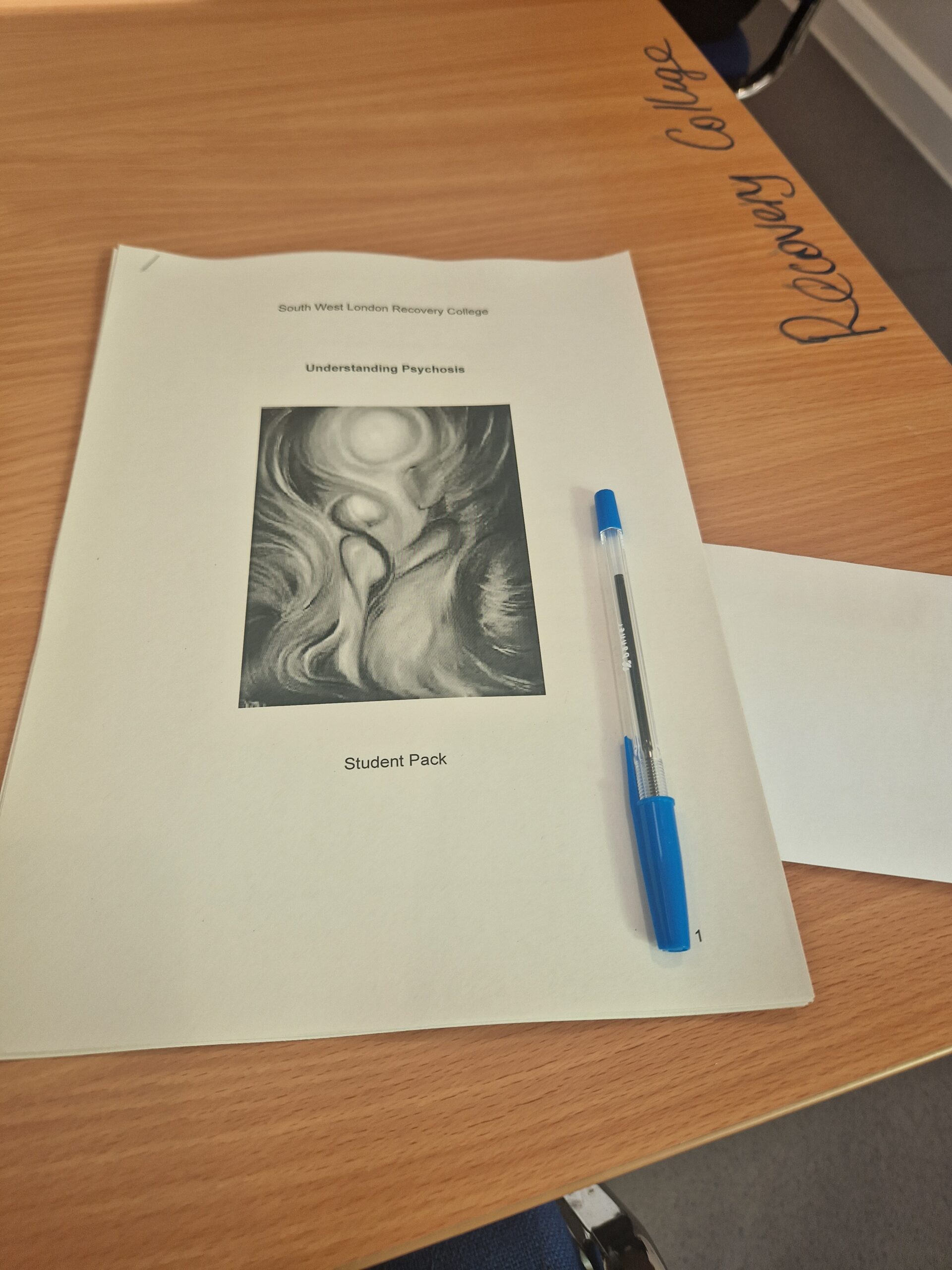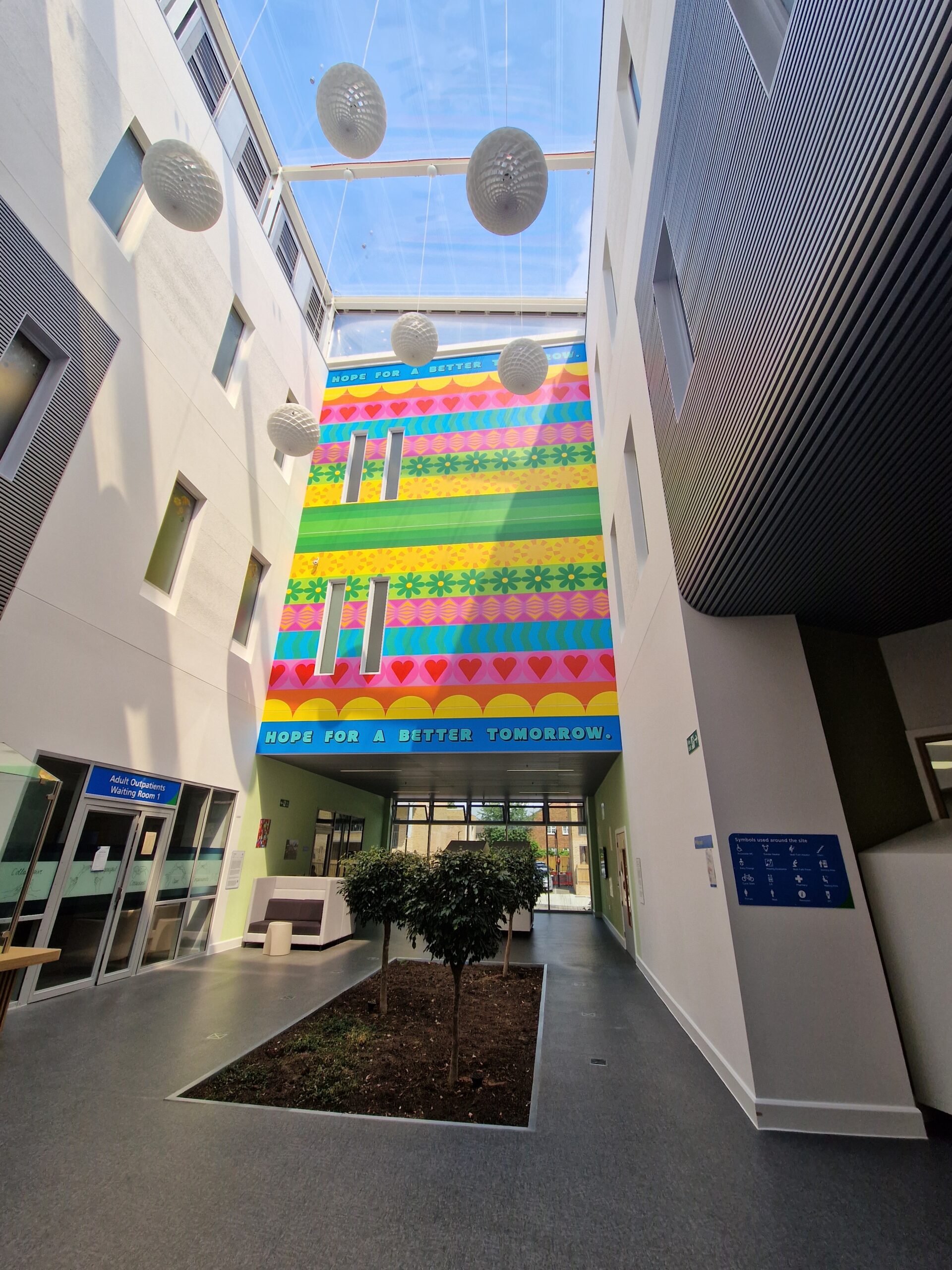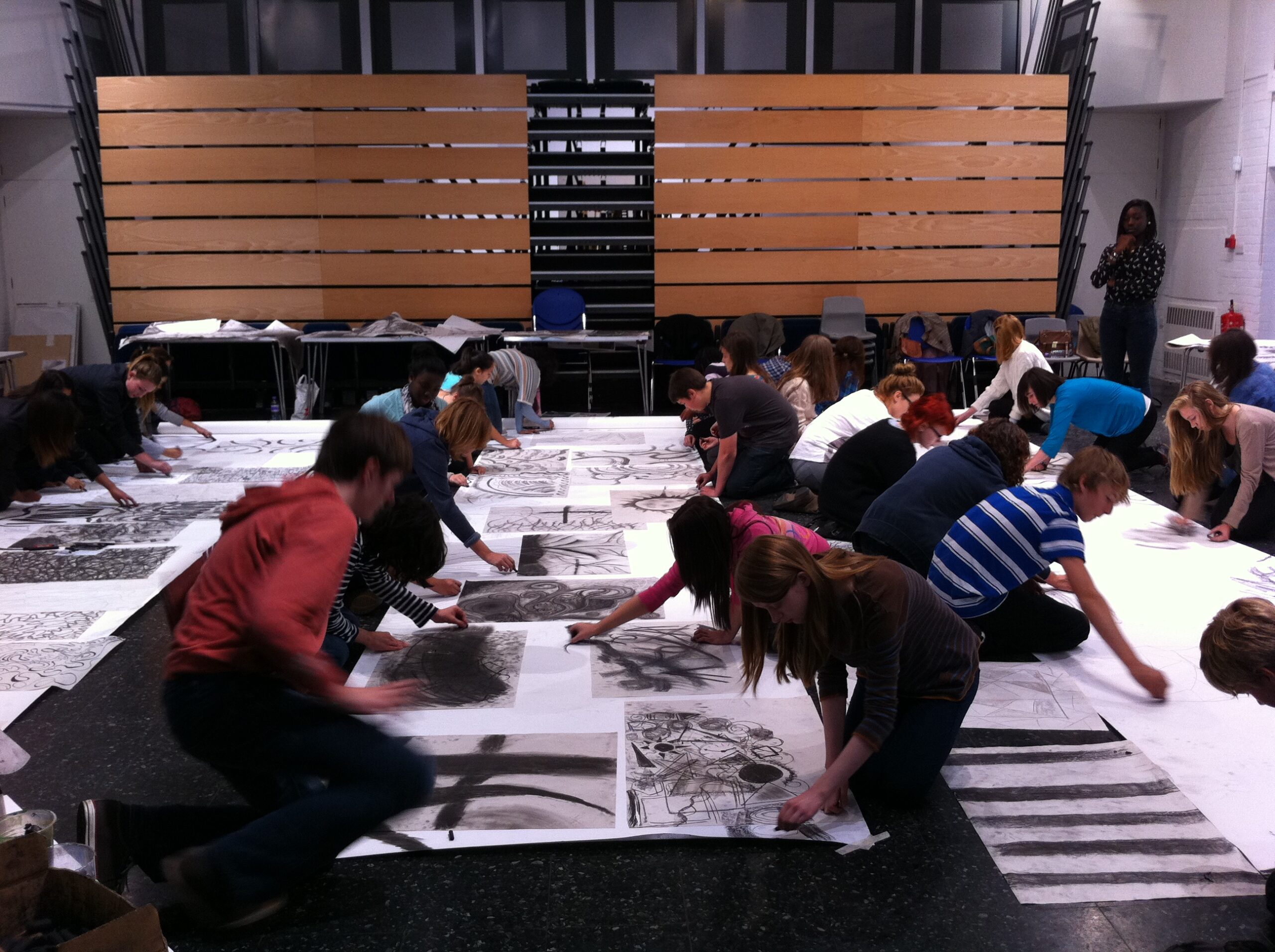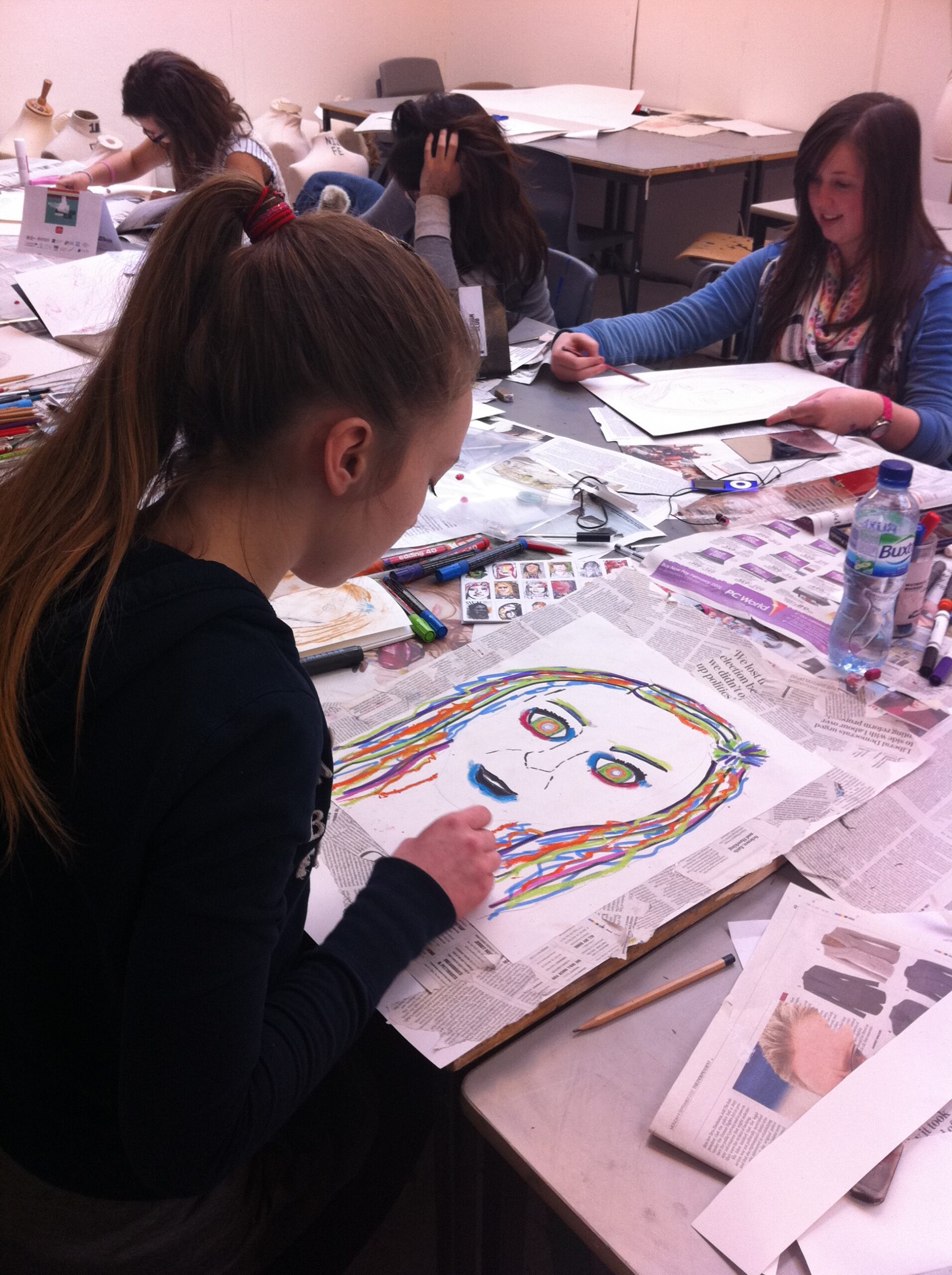Therapeutic Arts in Healthcare
At DODI, we believe life is a masterpiece, and our aim is to empower individuals to choose how they create it. Through our direct engagement with patients at Charing Cross Hospital since early 2023, we have focused on understanding the psychological and emotional impact of health challenges. Our commitment to integrating therapeutic art into healthcare settings provides patients with an opportunity to restore their identity and well-being through creativity.
By incorporating psychology, design theory, and personal experience, we aim to deliver therapeutic interventions that do more than distract – they empower. Our engagement with patients undergoing stroke recovery, cancer treatment, and mental health support has revealed the profound impact that creative expression can have on healing. We recognise that therapeutic art should not be passive; it must actively address the inner landscape of each patient, offering a means to reclaim their identity.
Now on a journey to becoming an HCPC-registered Art Psychotherapist through the University of Roehampton, dodi is building upon her research in fashion, philosophy and therapeutic design to extend the impact of art therapy within clinical and educational settings.

NHS Imperial Health - Charing Cross Hospital
7 North
Special Surgery (Major + Minor)
In the high-pressure environment of surgical wards, patients facing major or minor operations often experience anxiety and loss of control. We’ve found that engaging them in creative activities offers a moment of reprieve, allowing them to shift their focus away from pain and fear. Art can act as a tool for reclaiming a sense of self during times of vulnerability, giving patients an outlet to express their emotions and confront their fears in a constructive way.
6 North
Inpatient Oncology
On the oncology ward, where patients face the challenges of cancer diagnosis and treatment, we have used creative activities to rebuild self-esteem and identity. Simple actions like painting nails or personalising appearance help patients reconnect with their sense of self, which is often disrupted by illness. The act of creation here is not just about aesthetics but about empowerment. It allows individuals to regain confidence and navigate their emotional responses to trauma.
Marjory Warren
Acute Medical Unit
The acute medical unit (AMU) is a space filled with uncertainty, where patients await critical diagnoses or navigate the aftermath of medical crises. Art interventions here have provided an essential distraction from pain and worry, offering patients a therapeutic escape from the unknown. These activities help foster a sense of agency during moments when so much is beyond their control, highlighting the importance of integrating art as a healing tool.
9 South
Acute Stroke Unit
With first-hand stroke experience, dodi understands the deep sense of disorientation stroke survivors feel. Art offers a pathway to rediscover self-expression, even when language and movement are compromised. Our tailored therapeutic art interventions in the Acute Stroke Unit empower patients to communicate their emotions and frustrations in ways that words cannot, supporting both their physical and emotional recovery.
8 North
Mental Health Unit
On 8 North, working with patients who face conditions like schizophrenia, bipolar disorder, and personality disorders, dodi observed the calming effect of therapeutic arts. Through her discussions with the mental health clinicians, it is clear that art serves as a therapeutic tool to stabilise emotions, manage distress, and offer patients a safe space to explore their inner thoughts. Whether through painting or structured creative activities, art provides an outlet for self-expression and helps reduce the intensity of emotional episodes.
St George's University Hospitals NHS Foundation Trust
Dog Therapy
Hyper Acute Stroke Unit
Engaging with therapy dogs has proven to reduce cortisol and increase oxytocin, providing both emotional and physical benefits to stroke survivors. Patients who interact with therapy dogs report improved communication skills and increased confidence. These sessions provide a comforting and non-judgemental environment where patients can work on their recovery goals while benefiting from the calming presence of animals.
NHS SWLSTG Mental Health
The Recovery College
At the Recovery College, mental health recovery is supported through education and creative self-expression. Our observations and participation in classes reveal how the college helps individuals reconnect with hope, rebuild their identities, and foster a sense of control over their lives. Through artistic exploration, individuals are encouraged to design their personal narratives and embrace resilience as a guiding force in their recovery journey.
Integrating arts with mental health in children and adolescent development
Drawing from her personal journey of self-awareness and mental health exploration, dodi understands how powerful counselling and creative expression can be in confronting trauma and rebuilding confidence. Her philosophy, rooted in our podcast ‘an existential truth – a theory of ‘thingS,’ is embedded in our approach: helping individuals design lives of meaning through drug-free therapeutic practices. We focus on empowering young people to articulate their emotions through art, equipping them with the tools to overcome challenges and reinvent their identities.

Student Self-Awareness + Confidence
From School to University
Creative Psychosocial Support
dodi’s journey in art and design education spans a continuum, from teaching and inspiring young school students to mentoring budding designers at the university level, with a focus on elevating their self-awareness and confidence. From 2010 to 2014, she contributed to the Sorrell Foundation Saturday Arts Club at the University for the Creative Arts, where she had the privilege of teaching and nurturing the creativity of young minds.
After gaining invaluable industry experience, she returned to the University for the Creative Arts in 2024 as a Creative Tutor. Whether through workshops or one-on-one support, she guides students in using design as a medium for self-expression and personal growth.
MOBILE

Therapeutic arts in Healthcare
At DODI, we believe life is a masterpiece, and our aim is to empower individuals to choose how they create it. Through our direct engagement with patients at Charing Cross Hospital since early 2023, we have focused on understanding the psychological and emotional impact of health challenges. Our commitment to integrating therapeutic art into healthcare settings provides patients with an opportunity to restore their identity and well-being through creativity.
By incorporating psychology, design theory, and personal experience, we aim to deliver therapeutic interventions that do more than distract – they empower. Our engagement with patients undergoing stroke recovery, cancer treatment, and mental health support has revealed the profound impact that creative expression can have on healing. We recognise that therapeutic art should not be passive; it must actively address the inner landscape of each patient, offering a means to reclaim their identity.
Now on a journey to becoming an HCPC-registered Art Psychotherapist through the University of Roehampton, dodi is building upon her research in fashion, philosophy and therapeutic design to extend the impact of art therapy within clinical and educational settings.
NHS Imperial Health - Charing Cross Hospital
7 North
Special Surgery (Major + Minor)
In the high-pressure environment of surgical wards, patients facing major or minor operations often experience anxiety and loss of control. We’ve found that engaging them in creative activities offers a moment of reprieve, allowing them to shift their focus away from pain and fear. Art can act as a tool for reclaiming a sense of self during times of vulnerability, giving patients an outlet to express their emotions and confront their fears in a constructive way.
6 North
Inpatient Oncology
On the oncology ward, where patients face the challenges of cancer diagnosis and treatment, we have used creative activities to rebuild self-esteem and identity. Simple actions like painting nails or personalising appearance help patients reconnect with their sense of self, which is often disrupted by illness. The act of creation here is not just about aesthetics but about empowerment. It allows individuals to regain confidence and navigate their emotional responses to trauma.
Marjory Warren
Acute Medical Unit
The acute medical unit (AMU) is a space filled with uncertainty, where patients await critical diagnoses or navigate the aftermath of medical crises. Art interventions here have provided an essential distraction from pain and worry, offering patients a therapeutic escape from the unknown. These activities help foster a sense of agency during moments when so much is beyond their control, highlighting the importance of integrating art as a healing tool.
9 South
Acute Stroke Unit
With first-hand stroke experience, dodi understands the deep sense of disorientation stroke survivors feel. Art offers a pathway to rediscover self-expression, even when language and movement are compromised. Our tailored therapeutic art interventions in the Acute Stroke Unit empower patients to communicate their emotions and frustrations in ways that words cannot, supporting both their physical and emotional recovery.
8 North
Mental Health Unit
On 8 North, working with patients who face conditions like schizophrenia, bipolar disorder, and personality disorders, dodi observed the calming effect of therapeutic arts. Through her discussions with the mental health clinicians, it is clear that art serves as a therapeutic tool to stabilise emotions, manage distress, and offer patients a safe space to explore their inner thoughts. Whether through painting or structured creative activities, art provides an outlet for self-expression and helps reduce the intensity of emotional episodes.
St George's University Hospitals NHS Foundation Trust
Dog Therapy
Hyper Acute Stroke Unit
Engaging with therapy dogs has proven to reduce cortisol and increase oxytocin, providing both emotional and physical benefits to stroke survivors. Patients who interact with therapy dogs report improved communication skills and increased confidence. These sessions provide a comforting and non-judgemental environment where patients can work on their recovery goals while benefiting from the calming presence of animals.
NHS SWLSTG Mental Health
The Recovery College
At the Recovery College, mental health recovery is supported through education and creative self-expression. Our observations and participation in classes reveal how the college helps individuals reconnect with hope, rebuild their identities, and foster a sense of control over their lives. Through artistic exploration, individuals are encouraged to design their personal narratives and embrace resilience as a guiding force in their recovery journey.

Integrating arts with mental health in children and adolescent development
Drawing from her personal journey of self-awareness and mental health exploration, dodi understands how powerful counselling and creative expression can be in confronting trauma and rebuilding confidence. Her philosophy, rooted in our podcast ‘an existential truth – a theory of ‘thingS,’ is embedded in our approach: helping individuals design lives of meaning through drug-free therapeutic practices. We focus on empowering young people to articulate their emotions through art, equipping them with the tools to overcome challenges and reinvent their identities.
Student Self-Awareness + Confidence
From School to University
Creative Psychosocial Support
dodi’s journey in art and design education spans a continuum, from teaching and inspiring young school students to mentoring budding designers at the university level, with a focus on elevating their self-awareness and confidence. From 2010 to 2014, she contributed to the Sorrell Foundation Saturday Arts Club at the University for the Creative Arts, where she had the privilege of teaching and nurturing the creativity of young minds.
After gaining invaluable industry experience, she returned to the University for the Creative Arts in 2024 as a Creative Tutor. Whether through workshops or one-on-one support, she guides students in using design as a medium for self-expression and personal growth.
TABLET

Therapeutic arts in Healthcare
At DODI, we believe life is a masterpiece, and our aim is to empower individuals to choose how they create it. Through our direct engagement with patients at Charing Cross Hospital since early 2023, we have focused on understanding the psychological and emotional impact of health challenges. Our commitment to integrating therapeutic art into healthcare settings provides patients with an opportunity to restore their identity and well-being through creativity.
By incorporating psychology, design theory, and personal experience, we aim to deliver therapeutic interventions that do more than distract – they empower. Our engagement with patients undergoing stroke recovery, cancer treatment, and mental health support has revealed the profound impact that creative expression can have on healing. We recognise that therapeutic art should not be passive; it must actively address the inner landscape of each patient, offering a means to reclaim their identity.
Now on a journey to becoming an HCPC-registered Art Psychotherapist through the University of Roehampton, dodi is building upon her research in fashion, philosophy and therapeutic design to extend the impact of art therapy within clinical and educational settings.
NHS Imperial Health - Charing Cross Hospital
7 North
Special Surgery (Major + Minor)
In the high-pressure environment of surgical wards, patients facing major or minor operations often experience anxiety and loss of control. We’ve found that engaging them in creative activities offers a moment of reprieve, allowing them to shift their focus away from pain and fear. Art can act as a tool for reclaiming a sense of self during times of vulnerability, giving patients an outlet to express their emotions and confront their fears in a constructive way.
6 North
Inpatient Oncology
On the oncology ward, where patients face the challenges of cancer diagnosis and treatment, we have used creative activities to rebuild self-esteem and identity. Simple actions like painting nails or personalising appearance help patients reconnect with their sense of self, which is often disrupted by illness. The act of creation here is not just about aesthetics but about empowerment. It allows individuals to regain confidence and navigate their emotional responses to trauma.
Marjory Warren
Acute Medical Unit
The acute medical unit (AMU) is a space filled with uncertainty, where patients await critical diagnoses or navigate the aftermath of medical crises. Art interventions here have provided an essential distraction from pain and worry, offering patients a therapeutic escape from the unknown. These activities help foster a sense of agency during moments when so much is beyond their control, highlighting the importance of integrating art as a healing tool.
9 South
Acute Stroke Unit
With first-hand stroke experience, dodi understands the deep sense of disorientation stroke survivors feel. Art offers a pathway to rediscover self-expression, even when language and movement are compromised. Our tailored therapeutic art interventions in the Acute Stroke Unit empower patients to communicate their emotions and frustrations in ways that words cannot, supporting both their physical and emotional recovery.
8 North
Mental Health Unit
On 8 North, working with patients who face conditions like schizophrenia, bipolar disorder, and personality disorders, dodi observed the calming effect of therapeutic arts. Through her discussions with the mental health clinicians, it is clear that art serves as a therapeutic tool to stabilise emotions, manage distress, and offer patients a safe space to explore their inner thoughts. Whether through painting or structured creative activities, art provides an outlet for self-expression and helps reduce the intensity of emotional episodes.
St George's University Hospitals NHS Foundation Trust
Dog Therapy
Hyper Acute Stroke Unit
Engaging with therapy dogs has proven to reduce cortisol and increase oxytocin, providing both emotional and physical benefits to stroke survivors. Patients who interact with therapy dogs report improved communication skills and increased confidence. These sessions provide a comforting and non-judgemental environment where patients can work on their recovery goals while benefiting from the calming presence of animals.
NHS SWLSTG Mental Health
The Recovery College
At the Recovery College, mental health recovery is supported through education and creative self-expression. Our observations and participation in classes reveal how the college helps individuals reconnect with hope, rebuild their identities, and foster a sense of control over their lives. Through artistic exploration, individuals are encouraged to design their personal narratives and embrace resilience as a guiding force in their recovery journey.

Integrating arts with mental health in children and adolescent development
Drawing from her personal journey of self-awareness and mental health exploration, dodi understands how powerful counselling and creative expression can be in confronting trauma and rebuilding confidence. Her philosophy, rooted in our podcast ‘an existential truth – a theory of ‘thingS,’ is embedded in our approach: helping individuals design lives of meaning through drug-free therapeutic practices. We focus on empowering young people to articulate their emotions through art, equipping them with the tools to overcome challenges and reinvent their identities.
Student Self-Awareness + Confidence
From School to University
Creative Psychosocial Support
dodi’s journey in art and design education spans a continuum, from teaching and inspiring young school students to mentoring budding designers at the university level, with a focus on elevating their self-awareness and confidence. From 2010 to 2014, she contributed to the Sorrell Foundation Saturday Arts Club at the University for the Creative Arts, where she had the privilege of teaching and nurturing the creativity of young minds.
After gaining invaluable industry experience, she returned to the University for the Creative Arts in 2024 as a Creative Tutor. Whether through workshops or one-on-one support, she guides students in using design as a medium for self-expression and personal growth.
